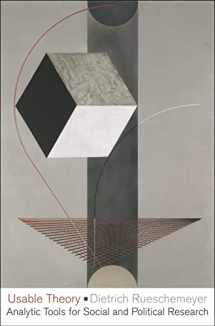
Usable Theory: Analytic Tools for Social and Political Research
ISBN-13:
9780691129587
ISBN-10:
0691129584
Author:
Dietrich Rueschemeyer
Publication date:
2009
Publisher:
Princeton University Press
Format:
Hardcover
352 pages
Category:
Research
,
Social Sciences
FREE US shipping
Book details
ISBN-13:
9780691129587
ISBN-10:
0691129584
Author:
Dietrich Rueschemeyer
Publication date:
2009
Publisher:
Princeton University Press
Format:
Hardcover
352 pages
Category:
Research
,
Social Sciences
Summary
Usable Theory: Analytic Tools for Social and Political Research (ISBN-13: 9780691129587 and ISBN-10: 0691129584), written by authors
Dietrich Rueschemeyer, was published by Princeton University Press in 2009.
With an overall rating of 4.0 stars, it's a notable title among other
Research
(Social Sciences) books. You can easily purchase or rent Usable Theory: Analytic Tools for Social and Political Research (Hardcover) from BooksRun,
along with many other new and used
Research
books
and textbooks.
And, if you're looking to sell your copy, our current buyback offer is $0.3.
Description
The project of twentieth-century sociology and political science--to create predictive scientific theory--resulted in few full-scale theories that can be taken off the shelf and successfully applied to empirical puzzles. Yet focused "theory frames" that formulate problems and point to relevant causal factors and conditions have produced vibrant, insightful, and analytically oriented empirical research. While theory frames alone cannot offer explanation or prediction, they guide empirical theory formation and give direction to inferences from empirical evidence. They are also responsible for much of the progress in the social sciences. In Usable Theory, distinguished sociologist Dietrich Rueschemeyer shows graduate students and researchers how to construct theory frames and use them to develop valid empirical hypotheses in the course of empirical social and political research. Combining new ideas as well as analytic tools derived from classic and recent theoretical traditions, the book enlarges the rationalist model of action by focusing on knowledge, norms, preferences, and emotions, and it discusses larger social formations that shape elementary forms of action. Throughout, Usable Theory seeks to mobilize the implicit theoretical social knowledge used in everyday life. Offers tools for theory building in social and political research Complements the rationalist model of action with discussions of knowledge, norms, preferences, and emotions Relates theoretical ideas to problems of methodology Situates elementary forms of action in relation to larger formations Combines new ideas with themes from classic and more recent theories


We would LOVE it if you could help us and other readers by reviewing the book
Book review

Congratulations! We have received your book review.
{user}
{createdAt}
by {truncated_author}


